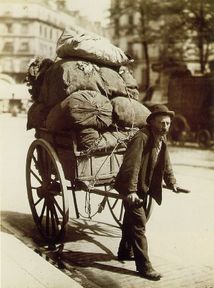
While cooking out on a recent Bank holiday, a man’s pinched and indecipherable voice sounded over a loudspeaker. Urrscrapren! Urrscraperon. As the voice and the blue van from which it emanated came closer the word became three: Yourscrap Iron! Your scrap iron!
This was the “rag and bone man,” scavenging town for cast off household items. The occupation might exist in some form in the states, but it was a novelty to me. So I watched with fasciation as the van stopped next door. Two heavy white women in dirt streaked tank tops and jeans a size too small, climbed down. The largest walked in pain, dragging her left leg behind her, but together they managed to heft the neighbor’s discarded exercise bike into the overstuffed boot. Then they carried on down the road, blasting the infernal recording, and leaving me, and only me in that party of Brits, enthralled.
For centuries, rag and bone men, or totters, have been scavenging cast off household items in towns throughout Britain and Europe. The name describes what, in the 19th century, they collected. Rags could be sold for up to three pence per pound to rag merchants or directly to rag paper makers. Bones, boiled to make soap and used for knife handles and other varied purposes, could be sold for the same price. Metals, such a copper or pewter, were more valuable: about four to five pence per pound. A rag and bone man might expect a six pence average daily wage in the 19th century, and while the trade has suffered in recent past, the high cost scrap iron has inspired a resurgence in the practice, which has never quite died away in northern towns near Manchester.
Do these modern scavengers, working through such obvious pain, make a living wage? Was this a second job? A third? I might have asked but I didn't want to slow them down, or to offend them with my curiosity. After all, they were not the novel characters in the scene. I was. What right did I have to waylay them or to ask about their lives? Instead, I stood staring after them long after the blue van rounded the bend and the sound faded away. Yet, their figures, pained and prideful, still haunt me. For months I've wondered about them: about their work, their lives and homes and the families, and about the many generations of lives upon which their livelihood stands.
That other Rag and Bone Man:
If you’re need soulful sound track to accompany your day, here's Rag ‘n’ Bone Man, Rory Graham, from Uckfield, East Sussex.
https://www.youtube.com/watch?v=L3wKzyIN1yk&list=PL0ASAbNKu0z0ZHL1gwmKq348dSSixL8nn
This was the “rag and bone man,” scavenging town for cast off household items. The occupation might exist in some form in the states, but it was a novelty to me. So I watched with fasciation as the van stopped next door. Two heavy white women in dirt streaked tank tops and jeans a size too small, climbed down. The largest walked in pain, dragging her left leg behind her, but together they managed to heft the neighbor’s discarded exercise bike into the overstuffed boot. Then they carried on down the road, blasting the infernal recording, and leaving me, and only me in that party of Brits, enthralled.
For centuries, rag and bone men, or totters, have been scavenging cast off household items in towns throughout Britain and Europe. The name describes what, in the 19th century, they collected. Rags could be sold for up to three pence per pound to rag merchants or directly to rag paper makers. Bones, boiled to make soap and used for knife handles and other varied purposes, could be sold for the same price. Metals, such a copper or pewter, were more valuable: about four to five pence per pound. A rag and bone man might expect a six pence average daily wage in the 19th century, and while the trade has suffered in recent past, the high cost scrap iron has inspired a resurgence in the practice, which has never quite died away in northern towns near Manchester.
Do these modern scavengers, working through such obvious pain, make a living wage? Was this a second job? A third? I might have asked but I didn't want to slow them down, or to offend them with my curiosity. After all, they were not the novel characters in the scene. I was. What right did I have to waylay them or to ask about their lives? Instead, I stood staring after them long after the blue van rounded the bend and the sound faded away. Yet, their figures, pained and prideful, still haunt me. For months I've wondered about them: about their work, their lives and homes and the families, and about the many generations of lives upon which their livelihood stands.
That other Rag and Bone Man:
If you’re need soulful sound track to accompany your day, here's Rag ‘n’ Bone Man, Rory Graham, from Uckfield, East Sussex.
https://www.youtube.com/watch?v=L3wKzyIN1yk&list=PL0ASAbNKu0z0ZHL1gwmKq348dSSixL8nn
 RSS Feed
RSS Feed
